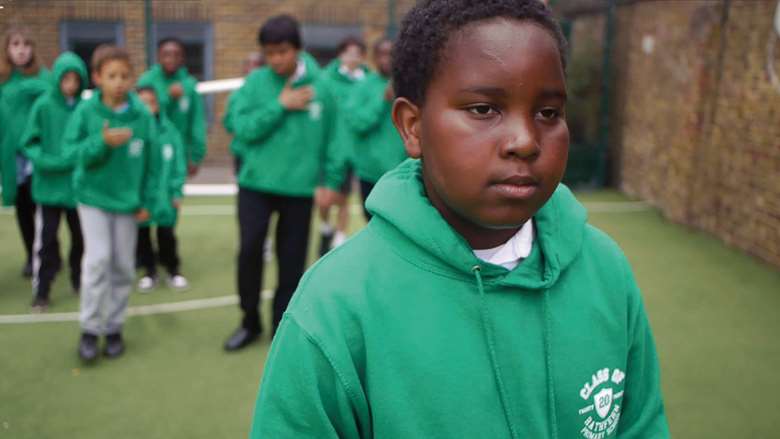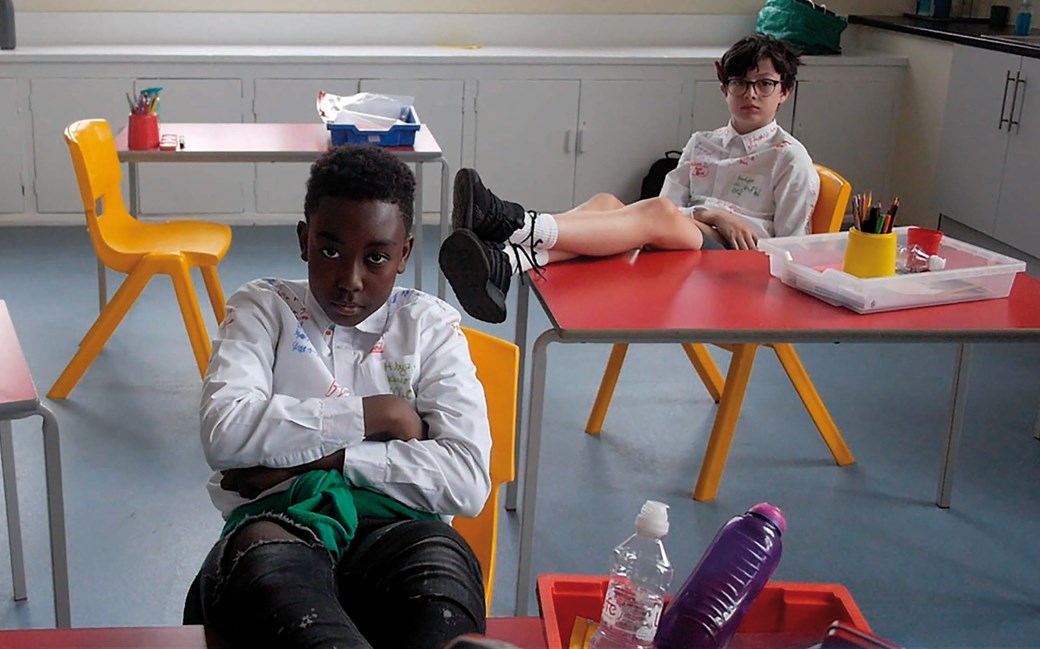Everything is possible: A Boat in an Endless Blue Sea
Harriet Clifford
Thursday, March 25, 2021
Last spring, composer Alastair White and soprano Kelly Poukens worked with a London primary school to create a piece of theatre that would obliterate all artistic boundaries. Harriet Clifford meets them to find out more about the project, now available to watch on YouTube.

Every good collaborative project starts with one person excitedly crying ‘There is something crazy – we have to do this!’ down the phone. In this case, classical soprano Kelly Poukens was in Belgium, where she lives, in the middle of a shop holding a bag of apples when she received the call.
The excitable voice on the other end belonged to composer Alastair White, who had just met Naheeda Maharasingam, headteacher at Rathfern Primary School in Catford, London. Between them they had hatched a plan – inspired by a conversation about politics, art and music, as all great plans are – to create an experimental opera with Year 6 children, facilitated and devised by White and Poukens on Zoom, but led in school by teachers Max Ellington, Sally McPherson, Rose Powell and Olivia Zulver.
Opera as anything
A few weeks later, in the Spring of 2020, they were on. The pair led morning sessions with the students, projected like ‘ridiculous avatars’ of themselves on the classroom wall. ‘It seems to almost be this divine punishment that we've watched so much Netflix that we've all been turned into televisions. Like Mike TV in Charlie and the Chocolate Factory’, says White.
During the sessions, Poukens and White introduced opera as a concept, presented themes and sparked ideas for the teacher-led afternoon workshops. Following the morning ‘lessons’ on music notation, themes and wider concepts, the children took the ideas that had been discussed and turned them into poems, pieces of physical theatre, sounds and painted graphic scores.
The result? A Boat in an Endless Blue Sea – a 10-minute video project (available on YouTube) realised through this fusion of graphic scores, sound art, poetry and physical theatre, all created by the children and collated by White, Poukens and visual artist Joel Chima.
‘In the first lesson, we said that opera can be anything. We gave lots of examples – we did a singing conversation between us and that kind of thing. We didn't start with a big Wagner opera as an example – that wasn't the point of this’, says Poukens.
The point, essentially, was to ‘test the limits’ of the possible and see what would happen. Another significant part was to provide an outlet for the children's emotions and their creativity, especially in the context of the pandemic.
White emphasised the role of the teachers in this: ‘That was one of the things Naheeda said at the beginning because she's a real advocate – a fighter – for these kids. Particularly at that age, you're having so much stolen from you and she wanted there to be something that could at least mark it as being different.’
Speaking about what the children took from it, Max Ellington, assistant head for KS2 and Year 6 class teacher, adds: ‘Firstly, children were exposed to what opera actually is. The vast majority had not experienced anything around opera, and before the project they only had some very simple and stereotypical views on what opera was.
‘They were able to express themselves musically, and through creating music, lyrics and words, they expressed their feelings about lockdown and what it had changed for them in their daily lives.’

Production shots from A Boat in an Endless Blue Sea
Safety and space
During our conversation, White highlights how open-minded the children were. ‘There was no need to tone anything down at all – rather it was to ramp things up. Compared to when you're talking to adults, who, when you try to explain that there's an idea behind something, are always a little bit suspect, children will just think things through and expand upon a concept.’
The children were also incredibly open to exploring challenging themes, and Poukens and White both highlight the Black Lives Matter scene in the final video. Poukens says she felt really moved: ‘It was such a big theme played by children – but they played it really rough, with the shooting and everything. At the beginning of this project, I never thought about this as a result – never.’
She adds: ‘These children had some really deep stuff in their small bodies. I think it was because of the pandemic. They were like, “Give us something that means we can put this [emotion] out of ourselves.” I felt their need.’
Both creators also stress that the material in the final piece is a hundred per cent created by the children. White says, ‘All those incredible monologues – that's just them working on their own. Same with the music – it's these graphic scores that they did and Ben Smith the pianist and Kelly realised them. We're the devisers in the sense of trying to show the techniques and demonstrate them.’
As most readers will know, devised theatre is usually very hands-on. For White, the virtual barrier was a good thing. ‘When you have people like Kelly and I there, perhaps we'd just be sticking our oar in a lot more. Us not being there gave the children more agency.’ Poukens adds: ‘I think there was a lot of safety for the children – a lot of space…and I think the reason was that we weren't there.’
On realising the music for the opera, Poukens viewed the children's paintings as contemporary music scores and made, she explains, some serious recordings from them. The pianist, Smith, used the same graphic scores, but they didn't combine vocals and piano until afterwards. ‘The fact that they join up so well is testament to how well the children's scores are structured – the textures all move at the same time’, says White.
Open to all
As you will see from the final production, White and Poukens are highly philosophical, creative, and experimental people. The concepts covered are not simple, but this was fully embraced by all. White tells me how one child was trying to work out how to vocalise non-sounds. ‘He eventually used the microphone in the graphic score because a microphone takes in sound like silence would – like a black hole.’
Both encourage all schools to work on something like this if they have the opportunity. ‘This is something that is open to all. You don't need any specialist training, just the willingness to want to explore. I think that's what all kids have and, if you let them lead it, it's possible in any school,’ says White.
Poukens adds: ‘I realised working with Alastair and everyone else on this opera that there's no box at all. Just think, what if there's no box? And indeed, everything is always possible.’
A Boat in an Endless Blue Sea is available to watch on YouTube at bit.ly/3rHu6Kv.
www.rathfern.lewisham.sch.uk; www.kellypoukens.com; www.alastairwhite.org

